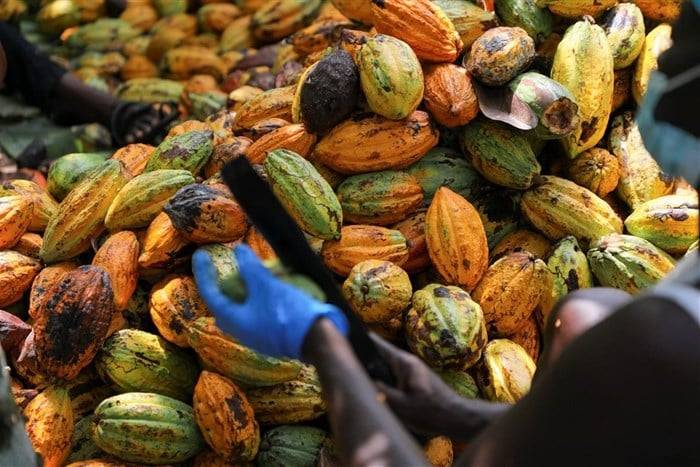In a move to safeguard the future of Ghana’s cocoa industry, a growing number of cocoa companies have announced significant investments aimed at mitigating the rising threats of crop losses in the country. According to a recent report, the increased investments from both local and international cocoa firms are part of a broader strategy to combat the challenges facing the cocoa sector, including climate change, pest infestations, and aging farms.
Ghana, the world’s second-largest exporter of cocoa, is heavily dependent on the crop for its economic stability. The cocoa sector accounts for approximately 25% of the country’s foreign exchange earnings, with millions of farmers relying on cocoa cultivation for their livelihoods. However, over the years, Ghana’s cocoa production has been facing a number of obstacles that threaten to reduce output and damage the industry’s growth prospects.
The Growing Challenge of Cocoa Crop Losses
Cocoa farmers in Ghana have been experiencing a sharp decline in yields due to a combination of factors. Climate change, particularly erratic rainfall patterns and rising temperatures, has led to less favorable growing conditions. This has resulted in poor crop development, especially during the crucial harvest seasons. Additionally, pests like the Cocoa Swollen Shoot Virus (CSSV) and Cocoa Pod Borer (CPB) have also been major contributors to crop losses, significantly impacting the volume and quality of Ghana's cocoa output.
Furthermore, the country's cocoa farms are aging, with many trees nearing the end of their productive lifespan. Poor farm management practices and limited access to modern farming techniques have compounded the problem, making it harder for smallholder farmers to increase productivity or manage the adverse effects of climate change and pests.
Cocoa Firms to the Rescue: Increased Investments
To address these challenges, several cocoa firms have stepped in with increased investments aimed at reducing crop losses and ensuring the long-term sustainability of the industry. These investments are focused on several key areas: providing farmers with access to better agricultural practices, improving farm productivity, combating pests and diseases, and supporting climate-resilient cocoa farming.
One of the major initiatives has been the provision of high-yielding, disease-resistant cocoa seedlings to farmers. This initiative is being supported by some of the world's largest chocolate manufacturers, such as Nestlé, Mars, and Hershey, who have pledged millions of dollars to help improve the resilience of Ghana’s cocoa farms. These companies are working in collaboration with the Ghana Cocoa Board (COCOBOD) to distribute quality seedlings, fertilizers, and pesticides, alongside training programs that teach farmers better cultivation methods.
Additionally, new agricultural technologies, such as mobile apps and digital platforms, are being used to provide real-time weather forecasts, pest management advice, and market pricing information to farmers. By empowering farmers with knowledge and resources, these companies hope to improve productivity and reduce losses associated with climate-related disruptions and pests.
Sustainability has been a central theme in the new investments being made in Ghana’s cocoa sector. The focus is not only on increasing crop yields but also on promoting environmentally friendly farming practices that can help mitigate the effects of climate change in the long run. Many cocoa firms are promoting agroforestry practices, which involve planting shade trees alongside cocoa crops, helping to protect the cocoa plants from extreme temperatures while also sequestering carbon.
These firms are also addressing the issue of child labor in cocoa farming, which has been a longstanding concern in the industry. By investing in education and creating better working conditions on farms, the companies aim to build a more ethical and sustainable supply chain. Some companies have introduced certification programs, such as Fair Trade and Rainforest Alliance, which require farmers to meet certain environmental and social standards in exchange for premium prices for their cocoa.
The Role of the Ghana Cocoa Board (COCOBOD)
The Ghana Cocoa Board (COCOBOD), the government agency responsible for managing the country’s cocoa sector, has also played a critical role in facilitating these investments. COCOBOD has worked closely with cocoa firms to ensure that the right policies and programs are in place to support both local farmers and international investors. In 2020, COCOBOD launched the Cocoa Rehabilitation and Replanting Program, which aims to replace over 1 million aged cocoa trees over the next decade, a critical move in addressing the issue of aging farms.
The board has also been working on expanding the sector’s infrastructure, improving cocoa roads, and streamlining the supply chain to ensure that farmers receive fair prices for their products. With these initiatives, COCOBOD hopes to increase Ghana’s cocoa production while ensuring that the industry remains competitive .
The investments being made by cocoa firms are expected to have a significant positive impact on Ghana’s cocoa industry. By increasing productivity and reducing losses, these efforts could help boost the country’s cocoa output, stabilizing the economy and improving the livelihoods of the millions of Ghanaians who depend on cocoa farming.
However, challenges remain. Ghana’s cocoa sector must continue to innovate and adapt to the changing global environment, particularly with the ongoing threat of climate change. Partnerships between government, private sector players, and international stakeholders will be key to ensuring that the investments made today lead to long-term success.


